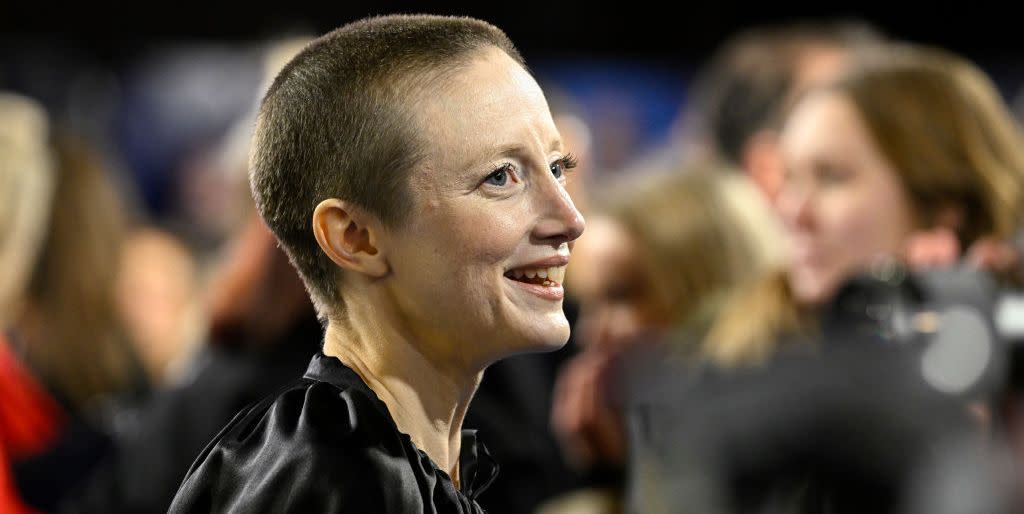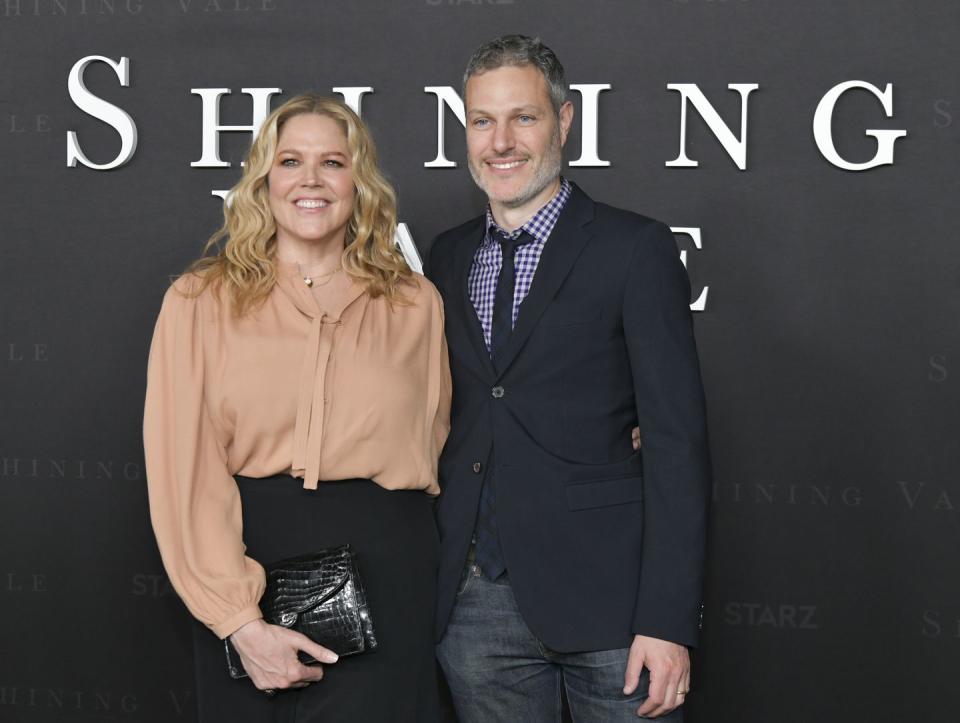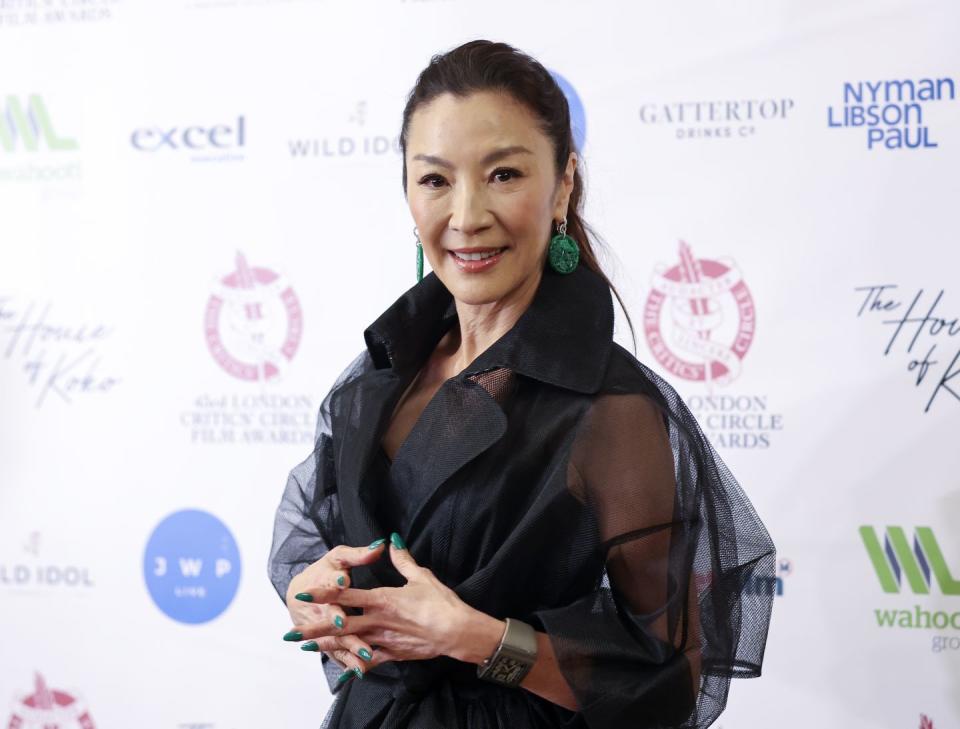Andrea Riseborough’s Surprise Oscar Nomination Is Controversial. Here’s Why.

- Oops!Something went wrong.Please try again later.
- Oops!Something went wrong.Please try again later.
- Oops!Something went wrong.Please try again later.
- Oops!Something went wrong.Please try again later.
- Oops!Something went wrong.Please try again later.
"Hearst Magazines and Yahoo may earn commission or revenue on some items through these links."
If you hadn’t watched or heard of To Leslie before this year’s Oscar nominations were announced in January, you aren’t alone.
The little-seen independent film—about an alcoholic single mother struggling to rebuild her life in West Texas—earned only about $27,300 at the box office before Andrea Riseborough received a surprise Oscar nomination for Best Actress. Her fellow nominees—and the films they star in—have decidedly greater name recognition: Cate Blanchett, Michelle Yeoh, Michelle Williams, and Ana de Armas.
Shortly before Oscar nominations voting began, a who’s who of Hollywood A-listers, including Jennifer Aniston, Gwyneth Paltrow, Charlize Theron, and Kate Winslet, suddenly started praising Riseborough’s performance. When Riseborough received her nomination, it was lauded as the result of an organic word-of-mouth campaign over traditional money-based campaigning.
Or was it? Critics soon alleged that Riseborough’s celebrity-driven push was no spontaneous grassroots effort but instead was due to behind-the-scenes connections and cronyism that flies in the face of the Academy’s regulations. Worse yet, some argued: It may have contributed toward Black actors like Viola Davis and Danielle Deadwyler missing out on their own expected nominations.
So what exactly happened? Read on to learn everything you need to know about the controversy before the Academy Awards ceremony next month.
A Quiet Fall Release
Shot over 19 days during the height of the COVID-19 pandemic in 2020, To Leslie had a very small budget and a limited theatrical run starting this past October but generated positive reviews, especially for Riseborough. In her review for The Hollywood Reporter, film critic Sheri Linden wrote the 41-year-old actor “delivers a performance that’s extraordinary in its moment-to-moment sparks of hope against hope and slow-dawning self-awareness amid the despair, dissembling, and self-delusion.”
To Leslie was shut out of the Golden Globes, Screen Actors Guild Awards, and Critics Choice Awards, though Riseborough did receive an Independent Spirit Award nomination. The film’s director, Michael Morris, said they simply had no money for awards season campaigning.
“We can’t even afford an ad,” Morris told The Hollywood Reporter. “We live or die by people’s reactions to the film. We’ve been so under the radar, and our only strategy has been to get people to see the film.”
The Academy of Motion Picture Arts and Sciences, which sets guidelines for how studios can campaign on behalf of their films, has about 9,500 members eligible to vote for nominees. Members fall within branches like actors, directors, cinematographers, and editors. At the nomination stage, each branch votes within its own categories (so the actor branch votes for acting nominations), and every branch votes for Best Picture nominees. This year’s nomination voting period was January 12 to 17.
A Growing Celebrity Chorus of Praise
In early January, just before and as members began voting for Oscar nominees, To Leslie was suddenly a constant topic of conversation among A-list actors praising Riseborough’s performance and advocating that she be considered for a Best Actress nod.
Blanchett name-dropped Riseborough while accepting her own Critics Choice Award on January 15. The day before, Winslet held a virtual Q&A with Riseborough, calling her work “the greatest female performance on-screen I have ever seen in my life.” Paltrow wrote on Instagram: “Andrea should win every award there is and all the ones that haven’t been invented yet.”
Aniston, Theron, Courtney Cox, and Sarah Paulson held screenings for the movie, and a huge amount of celebrities praised Riseborough on social media, including Amy Adams, Edward Norton, Laura Dern, Susan Sarandon, Howard Stern, Liam Neeson, Jane Fonda, Helen Hunt, Sally Field, Demi Moore, and Alan Cumming.
Best Actress Nomination Scrutinized

When Riseborough was among the Best Actress nominees announced on January 24, she was in disbelief. But it wasn’t long before allegations were raised about the celebrity effort on her behalf.
In his Hollywood newsletter, Puck’s Matthew Belloni claimed Mary McCormack, a veteran television actor and wife of To Leslie director Morris, emailed and called many of her performer colleagues, urging them to watch the movie and praise it online.
Soon, excerpts of emails appeared in Vanity Fair, with McCormack asking celebrities to support independent films like To Leslie amid a Hollywood largely dominated by big-budget Marvel movies. In one email, she even urged them to “post every day between now and Jan 17th” during the Academy nominations voting period.
“The movie cannot afford any [campaign] ads, so this letter and invitation will have to do instead,” McCormack wrote. “Word of mouth and critical acclaim is really all this movie has.”
Questions were raised about whether these emails violated Academy guidelines, which prohibit “contacting academy members directly and in a manner outside of the scope of these rules to promote a film or achievement for Academy Award consideration.”
McCormack had also invited some celebrities to a “very intimate reception” and screening at her home. Critics questioned whether that reception violated Academy rules that forbid members from attending unsanctioned dinners or events promoting films eligible for awards considerations.
Some of the celebrity social media posts also drew scrutiny. Actress Frances Fisher wrote on Instagram that Blanchett, Yeoh, Davis, and Deadwyler were “a lock” for a nomination, so voters should feel safe voting for Riseborough.
That post drew particular attention from the Academy because mentioning competitors while advocating for a nomination is strictly forbidden. The fact that Davis and Deadwyler were ultimately denied nominations added a racial element to the controversy, eight years after #OscarsSoWhite first trended online due to a lack of diversity among Oscar nominees. Critics said Riseborough benefitted from high-level connections that many Black artists lack.
The Academy Investigates
The Academy conducted an internal review into the matter. On February 1, Academy CEO Bill Kramer announced the film’s campaigning tactics did not rise to the level that Riseborough’s nomination should be rescinded.
“However, we did discover social media and outreach campaigning tactics that caused concern,” Kramer said in a statement. “These tactics are being addressed with the responsible parties directly.” He did not identify anyone by name.
Kramer also said “components of the regulations must be clarified to help create a better framework for respectful, inclusive, and unbiased campaigning.” He stressed that any changes to Academy rules will take place after the 95th Oscars ceremony on March 12.
Mixed Reactions to the Controversy

Both Riseborough’s word-of-mouth campaign and the Academy’s investigation into it have has drawn mixed reactions.
Variety Senior Awards Editor Clayton Davis wrote that it was not Riseborough’s fault no Black women were nominated for Best Actress, but the campaign on her behalf typified a system in which white artists can more easily attain recognition than artists of color. “In my 20 years covering the Oscar race, I’ve never witnessed such a concerted effort for a Black woman performer or director,” he wrote.
Actors like Christina Ricci and Marc Maron, Riseborough’s To Leslie co-star, criticized the Academy for its review. On an episode of his podcast WTF with Marc Maron, Maron said it was done “at the behest of special interest and corporate interest and just paranoia about how they look.” Ricci wrote on Instagram that it sends a message that the only films worthy of recognition are those that can afford expensive campaigns.
Fellow Best Actress nominee Yeoh told the BBC she didn’t feel Riseborough’s campaign broke any rules: “The Academy has always prided themselves into having regulations where we all play by the rules, and if [cheating them] was so easy, it would have been done before.”
How to Watch the Films Starring the Best Actress Nominees
Mark your calendar for the 95th Academy Awards ceremony on March 12 on ABC and streaming on FuboTV and Hulu. Before the big night, here’s how to watch the movies starring all five Best Actress nominees:
Blonde (starring Ana de Armas): Available on Netflix
Everything Everywhere All At Once (starring Michelle Yeoh): Available on Paramount+ with Showtime add-on
The Fabelmans (starring Michelle Williams): Available for purchase on Prime Video, Apple TV, Vudu, and Google Play
To Leslie (starring Andrea Riseborough): Available for rent and purchase on Prime Video
Tár (starring Cate Blanchett): Available on Peacock

